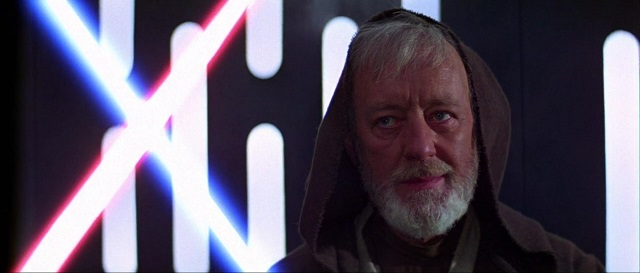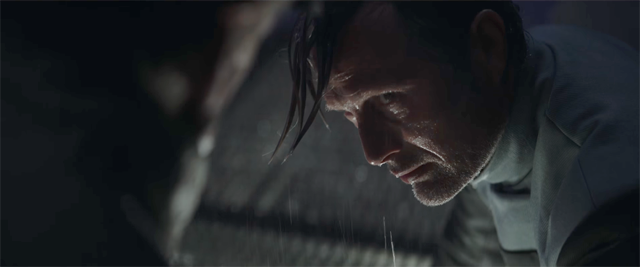
“A Jedi uses the force for knowledge and defense; never for attack” – Yoda
The above quote by Yoda in The Empire Strikes Back is one of the foundational quotes for understanding how the Jedi were supposed to operate. Gifted with their connection to the Force, which they honed through discipline and training, they were to confine their actions to gaining knowledge and to defending others. If they go on the offensive, they fall prey to the temptations of the dark side.
This idea was a major theme of Return of the Jedi. We see Luke throughout that film wavering between light and dark. While walking into Jabba’s palace and Force choking a couple of guards is a badass move, it’s not the job of a Jedi to be cool and powerful. There’s a reason Luke enters the palace in shadow with a big black cape flowing behind him – will he fall like his father?
Before the Emperor, the times when Luke comes close to falling are when he goes on the attack, goaded by his love of his friends. The Emperor says that his friends will die, and Luke attacks. Note, this is not defending his friends – it won’t stop what is going out there. It is an attempt at revenge. It is simply attack. Likewise, when Vader goads him into attacking, he’s not doing anything to actually protect Leia. Instead, he is acting on his passion. That is why the Emperor cackles, “good” when Luke defeats Vader. Luke hasn’t been acting as a Jedi; he has been on the attack, following his passion, acting without knowledge.
Contrast this with the redemption of Vader, who is returned to the light side of the Force when he acts simply and solely to defend Luke. Vader gains no power by this act. In fact, he suffers. It doesn’t placate his passions (especially as originally scripted without the “noooooo”). He simply is defending Luke. That is the way of a Jedi.
This ethos shows up in our most recent film, Rogue One. In Rogue One, the Jedi are gone. Even their old temple planet gets partially destroyed, the old holy city wiped out. Yet in the film there are two pairs of people who are somewhat devoted to the force; Lyra and Galen, and Chirrut and Baze. And in each case, one holds to knowledge and defense while the other doesn’t.
First, the Ersos – Lyra and Galen. If you have read Catalyst (which I recommend), Lyra is described as being a fervent admirer of the Jedi, a devotee of the force, while Galen is somewhat colder, more distant. One would expect that in Rogue One, the character who would act for knowledge and defense would be Lyra. However, she doesn’t. Instead of defending her young daughter and seeing her to safety, she goes off on a poorly thought out assassination attempt. And she dies for it. Pointlessly. No good comes of her death whatsoever.

The contrast with Galen is drastic. Galen ends up embodying the Jedi ideal by working for knowledge and defense. He takes upon himself suffering and hardship in order to understand the workings of the Death Star and find a way that it can be defeated. And why? Not to get rid of his enemies, but to defend his daughter. And because of his selfless efforts, the Death Star will end up being destroyed. Galen knew that with or without him (and with or without Krennic), the Death Star would eventually be created – but through knowledge he is able to bring about its destruction, helping to save countless lives.
We also see two former Guardians of the Whills, Chirrut and Baze. Chirrut has maintained his faith, Baze has lost it (even though he used to be the most faithful of the Guardians). And they end up following different paths and meeting different ends. Consider Chirrut – he is killed after risking his life to ensure the transmission of the Death Star plans (even as Baze begs him to return). It’s a great sacrifice, yet he dies in peace. He wasn’t a Jedi, but it was a very Jedi-like approach.
Baze follows a different path to his own death. There is a beautifully touching scene where Baze talks to Chirrut as Chirrut is dying, and Chirrut comforts him. “Look for the Force and you will always find me.” And the audience would think that Baze starts to look to the Force again – he gives the Guardian “prayer” – but then, he doesn’t act according to the Jedi ideals. In true war film fashion, Baze goes out in a berserker blaze of glory. Don’t get me wrong – it’s a cool scene seeing him mow down death troopers, but to what end? Whom is he defending? What goal is he accomplishing? How is he serving others (for as Chirrut notes some of his first words in the film, may the Force of others be with you)? He’s not. It is an empty death, not full of light and service, but full of despair and rage.
In this Rogue One dealt beautifully with the Jedi ideals, even though there were no Jedi on screen. This hasn’t always been the case in the other films or in the Expanded Universe. There have been times when it seems as though the Jedi are vehicles for creating neat special effects more than they are idealistic servants. Much of the egregiousness has been consigned to Legends status, but what of what is to come in the main series?
In The Force Awakens, Rey is just beginning to deal with the Force. The emotional peak of the film is when she duels Kylo Ren. Yet, as much as I love that lightsaber battle between Ren and Rey, it is troublesome to me. At first Rey reaches out with the Force to defend Finn, calls the lightsaber to her hand and takes up her destiny. This is the path of the Jedi, but she is outmatched and losing. Kylo Ren backs her into a corner, tells her that she needs a teacher in the ways of the Force. And being reminded of the Force, she becomes aggressive, attacks, scowls, and is fierce. She defeats Ren, and she is considering striking him down for good, but before she can, the chasm opens and she flees.
Kylo Ren was right – Rey does need a teacher. That is how the movie ends – with Rey standing before Luke Skywalker. But I am left to wonder on what path the movies will take Rey in her journey. Will it be the path of sacrifice, of using the Force for knowledge and defense, or will it be a path of power and dominance? And if it is the latter, will that be displayed as what is truly the Jedi way? Will future Jedi still be determined to use the force for knowledge and defense, never for attack? I hope so, but we will just have to wait and see.

When I hear that Obi-Wan quote, I always think of the fight between Yoda and Dooku at the end of Episode II, where Dooku is throwing metal and lightning at Yoda and Yoda just shrugs it off. They end up fighting saber to saber.
I think, too, that the Jedi philosophy reflects their use of the lightsaber. It’s a very cool weapon from our perspective, but it’s also massively impractical. Imagine how much deadlier Jedi would be if they used sniper rifles! I think there is something interesting in the choice of such an impractical weapon, especially by a group that could kill with their minds. It suggests an ethical position that the use of violence *should* be difficult, both practically and emotionally. It’s an especially interesting stance in light of the push-button warfare that increasingly dominates our own contemporary world.
I can get behind the notion of lightsaber use as an art form that requires discipline, patience, etc, but I’ve always thought they were still pretty damn violent—I’d rather get Force pushed against a wall and knocked out than lose an arm. For that reason I always liked Jedi like Fae and Laranth Tarak in the EU who eschewed lightsabers altogether.
I think the lightsaber speaks more eloquently to the role of violence in the ideal Jedi ethos. Part of the impracticality of a lightsaber is that it is so binary in its effects – it can be used as a shield, but unlike a blaster it doesn’t have a “stun setting.” Perhaps there is some utilitarian calculation where the use of the Force (or a stun blaster) to physically overpower someone is actually a net improvement over the use of a lightsaber. On the other hand, maybe the idea of gentler or more decisive violence just makes it easier to justify violence as a solution to problems. Perhaps there is something to the idea that if you aren’t ready to use the lightsaber – if the circumstance does not warrant difficult and exacting face-to-face bodily harm – then you shouldn’t be resorting to violence at all. I think the old Legends concept of “Form Zero” captured this idea pretty well. Part of the virtue of a lightsaber is that you can’t hide from its consequences, which in turn promotes the search for non-violent solutions to problems. The terrible binary of the lightsaber is itself an inducement to seek non-violence.
Or maybe that’s a load of superstitious Jedi crap – my intent here is not to stake out a position, but merely to describe what I think is a coherent “Jedi” point of view on the subject. For my own part, I am sensitive to the more utilitarian argument that tailored and highly-effective violence might in many cases be preferable to the sort of binary that I am describing, especially if we conceive of highly-effective violence as minimizing the total human impact of violent suffering by making violence more decisive, or less painful. That said, I can also see the appeal of the idea of the “difficult weapon,” which I also think is in keeping with much of what we have seen about Jedi teaching on violence.
P.S. – Forgot to mention in my original response, but thanks to the author for a great read!
I remember reading in one of the Jedi-code style books where basically the more and more damage you did with the light saber, the more disgraceful it was to the Jedi.
Basically, it was meant to be a weapon that would incapacitate folks — you stab a thigh of the incorriagble, and they go down, in great pain, but everything is cauterized. Then a bit worse is to lop off a limb – again, they live (and there are artificial limbs), but it simmers things down quickly — like Obi-wan in the club in AOTC. Then above that is lopping off a head – only when it’s serious.
It’s a weapon that is highly defensive and also intimidating. The Jedi says lay down your arms, or he can lay down your arms for you.
“I, Jedi” talked a bit about this – where Corran Horn’s grandfather would normally do his investigations in civvies, but when it came to hunt down criminals, he’d put on the Jedi garb and have the lightsaber — it was an inspiration to the criminals to just come in quietly.